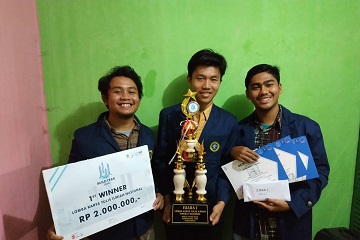Initiating an Environmentally Friendly House, IPB Students Win First Place in the Build Year 2018

Three students from the Department of Civil and Environmental Engineering (SIL), Faculty of Agricultural Technology (Fateta) of Bogor Agricultural University (IPB), Akhmad Nabil Punggawa, Hilman Ridho Rahman, and Muh. Irham Sahana initiated the Eco-Friendly House (Rumangka). Rumangka offers four environmentally friendly systems, namely green roof system, natural lighting, rainwater treatment system, and domestic waste treatment.
This idea of Rumangka, an Environmentally Friendly House as a Solution for Land Conversion in Bogor City has led them to become 1st winner in the National Scientific Writing Contest (LKTIN) of Build Year 2018, held by the Building Engineering Student Association (Himapensil) of Sebelas Maret State University (UNS) (23-25/11).
“In initiating Rumangka, we applied the concept of urban agriculture and took samples of Bogor City. This green roof system adheres to urban farming system on the roof of a house by utilising engineering themed Evaporative Cooling. Green roof has eight layers, namely plants, planting media, filter membranes, drainage, insulator membranes, waterproof membranes and concrete roofs,” said Irham.
Using rainwater storage, an insulator membrane is used to cool the room below it so that it can reduce the temperature by two degrees during the day and one degree at night. “We use beans for the cultivation of plants because it can withstand extreme weather,” explained Irham.
The second system is natural lighting. This system leads to home design with many windows so it can save the use of lamps. The lamp used is an LED lamp. “Using LEDs can save 121,000 rupiah per month,” conveyed Irham.
The third system is the Rainwater Harvesting System (SPAH). The use of this system can substitute 48.9 percent of water usage for home needs. Rainwater substitution can only be used to flush toilets, wash dishes, water plants, and wash vehicles. “This system can save 28,000 rupiah per month,” said Irham.
The fourth system is solid and liquid domestic waste treatment. Liquid waste is divided into two types, namely black water and grey water. Black water waste is from the bathroom which then processed using a septic tank technique with a biority system. While grey water comes from used dish-washing and clothing water and the treatment uses a portable fiber glass grease trap system. For solid waste, the organic waste is processed into compost. Compost processing can produce 340,000 rupiah per month with 408 kg compost/year.
“Based on the assessment and the ranking result by referring to the Green Building Council Indonesia (GBCI) assessment criteria, Rumangka;s score is 44 and its level is Gold. This is a good result considering that the levels of the GBCI reference starting from the highest are premium, gold, silver, and bronze,” explained Irham.
When linked to the Sustainable Development Goals 2030, Rumangka can guarantee sustainable consumption and production patterns and ensure the availability of sustainable water and sanitation treatment.
“There are three things that can be concluded from Rumangka, namely saving land by maintaining agricultural land in urban areas, then saving energy in the form of harvesting rainwater and natural light, as well as saving life with integrated waste processing,” he said. (KR/Zul/ZSP)


